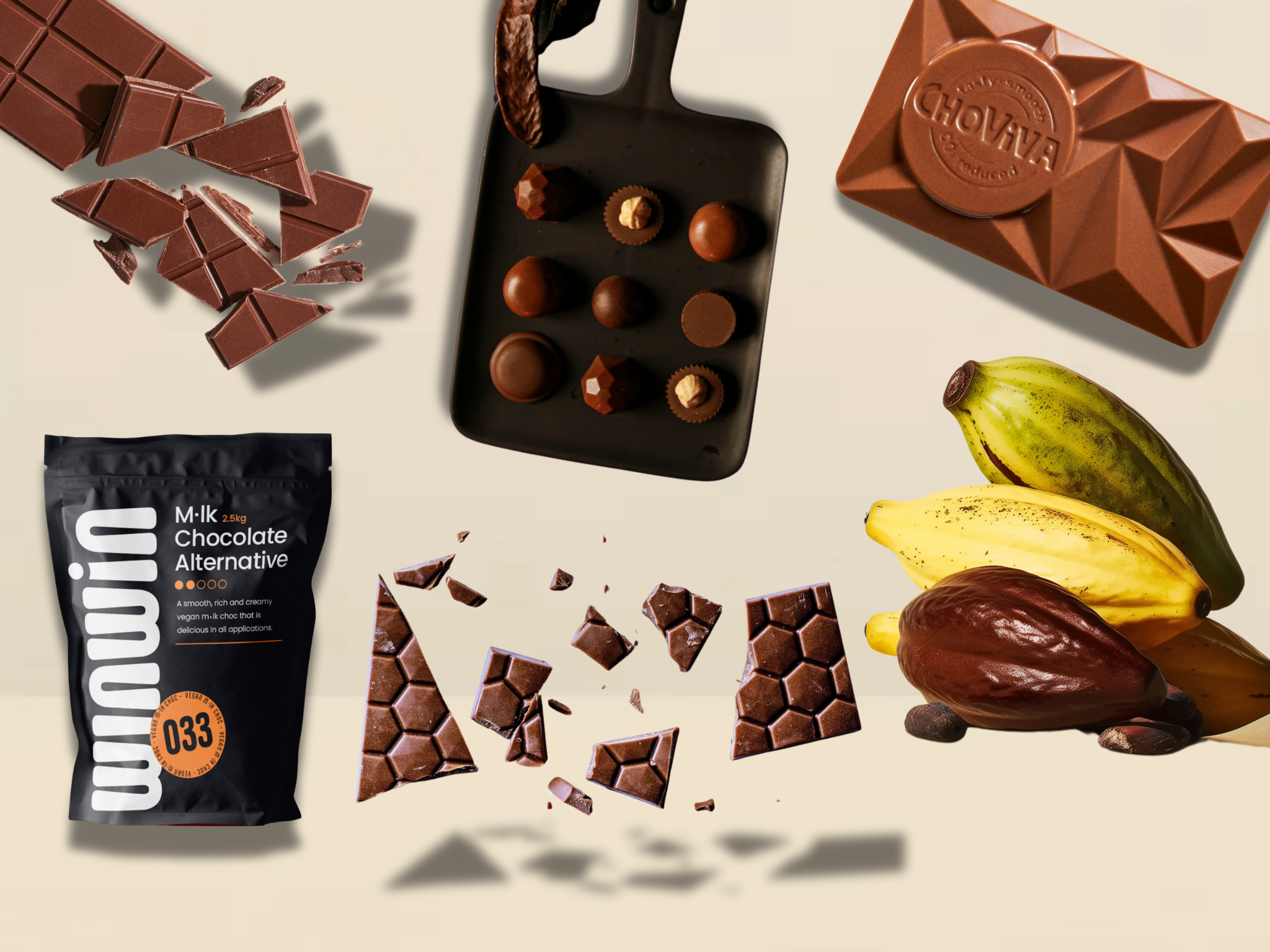
The world loves chocolate, but the planet itself? Not as much. Industry giants like Mondelēz, Lindt and Barry Callebout understand that, and are backing startups changing the game with cocoa-free and cell-based alternatives.
Chocolate may be omnipresent in the food industry today, but that may not be the case a few decades down the line.
Thanks to climate change, cocoa trees are under threat, and a third could die out by 2050. The crisis has wreaked havoc on harvests over the last couple of years, particularly affecting West Africa, which caters to the majority of the world’s cocoa needs. That, in turn, pushed cocoa futures to their highest on record – and without mitigation, prices will continue to rise.
While fossil fuels and animal agriculture are the two main causes of the climate emergency, chocolate itself also has a sizeable impact on the planet. Apart from beef, no other food emits as much carbon as dark chocolate does. And one bar of chocolate requires 1,700 litres of water.
The widespread use of palm oil in the sector, meanwhile, has contributed to mass deforestation – in Ivory Coast, the leading producer of the crop, over 85% of forest cover has been lost since 1960. The UK and the EU have both announced bans on deforestation-linked chocolate – although the latter has now been delayed, in response to pressure from businesses and national governments alike. But the move was criticised by many, including Barry Callebaut, the world’s largest B2B chocolate distributor.
The reality is: cocoa farmers and chocolate producers are under pressure to lower both their impact on climate change, and climate change’s impact on them.
With Mondelēz International, a chocolate giant, exploring a takeover of its contemporary Hershey’s, the cocoa industry is going through a sea change. It’s already worth over $100B, and it will only continue to grow. But as things stand, current practices are simply not sustainable. We need alternatives – not necessarily to replace the cocoa trade, but to supplement and support it in the face of the climate crisis.
Several innovative startups are taking an axe to carbon-heavy production methods by using agricultural sidestreams and more sustainable ingredients to make chocolate alternatives – much like plant-based meat analogues – while some are culturing cocoa cells in bioreactors to make bioidentical products like cocoa powder and butter.
Leaders in the chocolate space – from Lindt and Cargill to, yes, Mondelēz and Barry Callebaut – recognise the need for change, and are supporting these up-and-comers with investments and partnerships
Here are nine alt-chocolate companies safeguarding both cocoa and the climate.
Voyage Foods
Headquarters: Oakland, California, US
Founder: Adam Maxwell
Total funding: $94M

The best-funded company in the space, Voyage Foods turns a base of grape seeds, sunflower protein, RSPO-certified palm oil and shea kernel oil into chocolate-like compound products that can reduce emissions by 81-84% compared to conventional chocolate. These form part of its B2B offerings, as well as its nut-free hazelnut spread (similar to a vegan Nutella).
The ethical pantry startup has additionally won a $25M loan from the USDA to help build a large-scale factory in Mason, Ohio. It has also tapped Cargill to be its exclusive B2B distributor globally, and plans to launch products in Europe soon. (Plus, it makes nut-free peanut butter and beanless coffee.)
Planet A Foods
Headquarters: Planegg, Germany
Founders: Sara and Maximilian Marquart
Total funding: $53.4M

Founded by siblings, Planet A Foods uses traditional fermentation and roasting methods to transform oats, sunflower seeds and shea butter into ChoViva, its cocoa-free chocolate alternative. The innovation has made it into 20 products available in 42,000 stores across Europe, and will soon appear in the UK and France, followed by the US and Asia later on.
These items are part of collaborations with Lindt, Piasten, Lambertz, Griesson-de Beukelaer, Peter Kölln, Lufthansa, and Deutsche Bahn (during Euro 2024). ChoViva has also made it into private-label offerings from Rewe (and its subsidiary Penny), Edeka, Lidl, and Aldi. The company is additionally working on a precision-fermented ChoViva Butter too, converting single-cell oils, agricultural sidestreams and local feedstocks like beet sugar into a fat resembling cocoa butter (slates for a 2026 launch pending regulatory approval).
Win-Win
Headquarters: London, UK
Founders: Ahrum Pak & Johnny Drain
Total funding: $5.6M

Formerly known as WNWN Food Labs, Win-Win is modernising carob-based chocolate by combining the ingredient with barley, sunflower flour, and tiger nuts, alongside RSPO-certified palm oil and shea butter. The company also employs fermentation to produce its cocoa-free offering.
It has previously rolled out dark chocolate thins, a Daim-style Waim! bar, and copycat versions of Cadbury Wholenut, Terry’s Orange and Tony’s Chocolonely on limited runs, and trialled an ice-cream bar at the Häagen-Dazs Start-Up Innovation Challenge. Its current lineup for B2B clients includes dark, milk and white chocolate, and a vegan oat milk chocolate. These have been used at Toad Bakery and Lyaness bar in London, and Sem, a wine bar in Lisbon.
Celleste Bio
Headquarters: Misgav, Israel
Founder: Hanne Volpin, Orna Harel, Avishay Levy, and Daphna Michae
Total funding: $4.5M
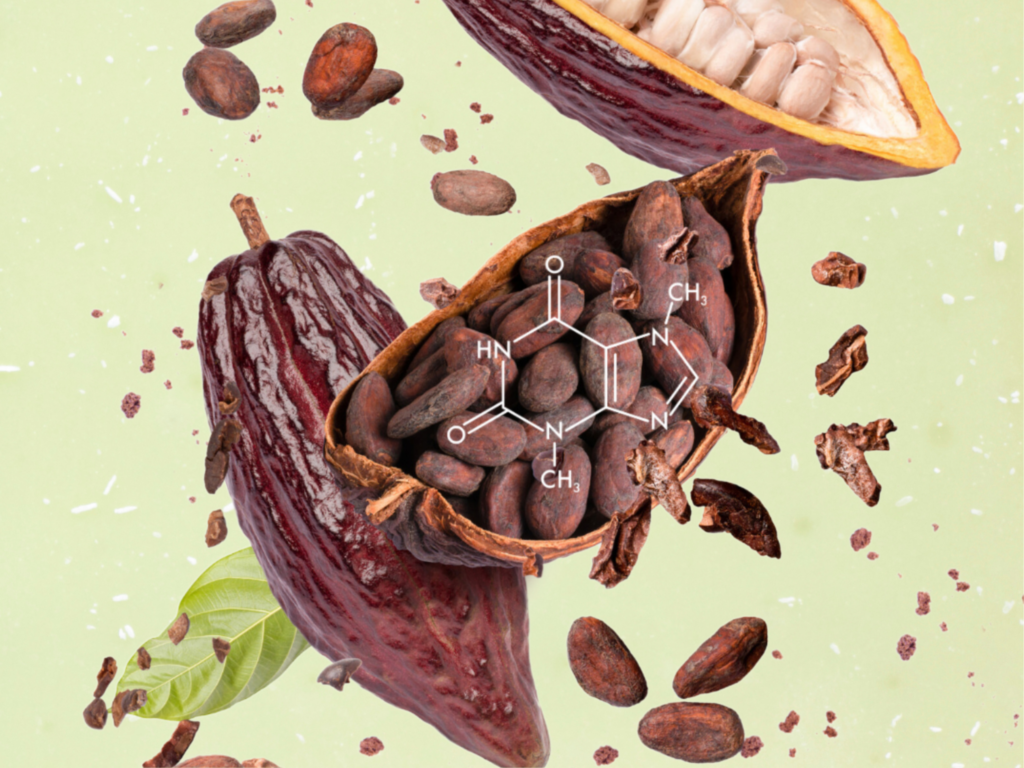
One of the few startups developing cell-based chocolate, Celleste Bio takes one or two beans from a cacao pod just once, and grows them in controlled settings with water and nutrients. The continuous cycle allows it to create one tonne of cocoa butter, which usually requires four tonnes of pods.
It marries agtech and biotechnology with artificial intelligence to extract the cells from cacao plants, and has been backed by The Trendlines Group and Mondelēz International. It is currently accelerating its R&D efforts, expanding infrastructure, and advancing the tech capabilities needed to pilot and scale up the production of its cell-based cocoa ingredients.
California Cultured
Headquarters: West Sacramento, California, US
Founder: Alan Perlstein
Total funding: $4M
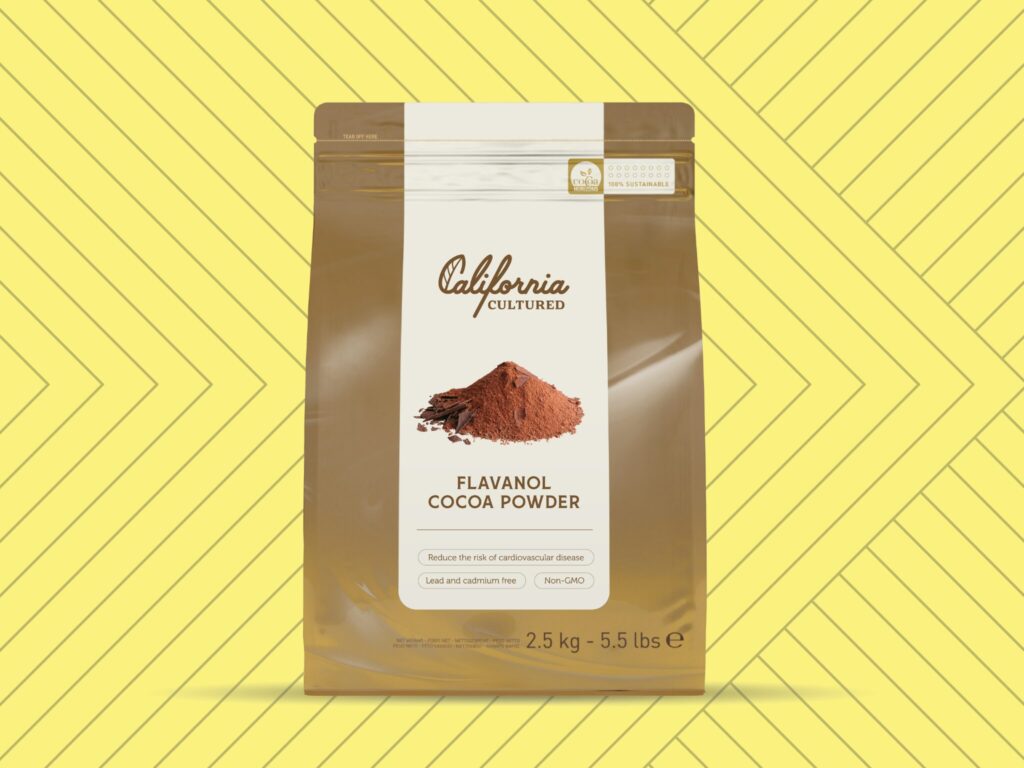
Using plant cell culture to make chocolate, California Cultured collects samples from a cacao plant with ideal organoleptic properties and extracts its cells, which are then cultivated in fermentation tanks that mimic the conditions of rainforests where cocoa thrives. Within three to four days, the cells are ready to be harvested, fermented and roasted.
The company requires novel food approval from food regulators in the markets it wants to sell in, and is in the middle of the process to self-determine its lab-grown cocoa as GRAS (Generally Recognized as Safe) in the US. It received a capital injection from Sparkalis, the VC arm of Puratos, in September, and has struck a 10-year deal to supply its Flavanol Cocoa Powder to Japanese chocolate giant Meiji.
Foreverland
Headquarters: Bari, Italy
Founders: Giuseppe D’Alessandro, Massimo Sabatini, Riccardo Bottiroli and Massimo Brochetta
Total funding: $3.76M

Another carob innovator, Foreverland is leveraging Italy’s standing as the second-largest producer of carob for its cocoa-free alternative, called Choruba (previously Freecao). The startup addresses a key food waste problem: 90% of carob ends up being wasted, with only the seed being used to produce locust bean gum. Foreverland blends the byproduct with grains, sugar and vegetable fats to make chocolate that requires 90% less water and emits 80% fewer greenhouse gases.
Foreverland has previously launched limited-edition batches of Easter eggs, pralines and panettone, and recently brought out chocolate-covered almonds with nut producer Pioppo. It’s in talks with several other brands, and has plans to introduce additional products like vegan milk, dark, and white chocolate alternatives, as well as spreadable creams. And earlier this year, it won the inaugural FoodTech World Cup at the HackSummit in Lausanne, beating out eight other finalists.
Nukoko
Headquarters: Guildford, UK
Founders: Ross Newton, Kit Tomlinson and David Salt
Total funding: $1.5M
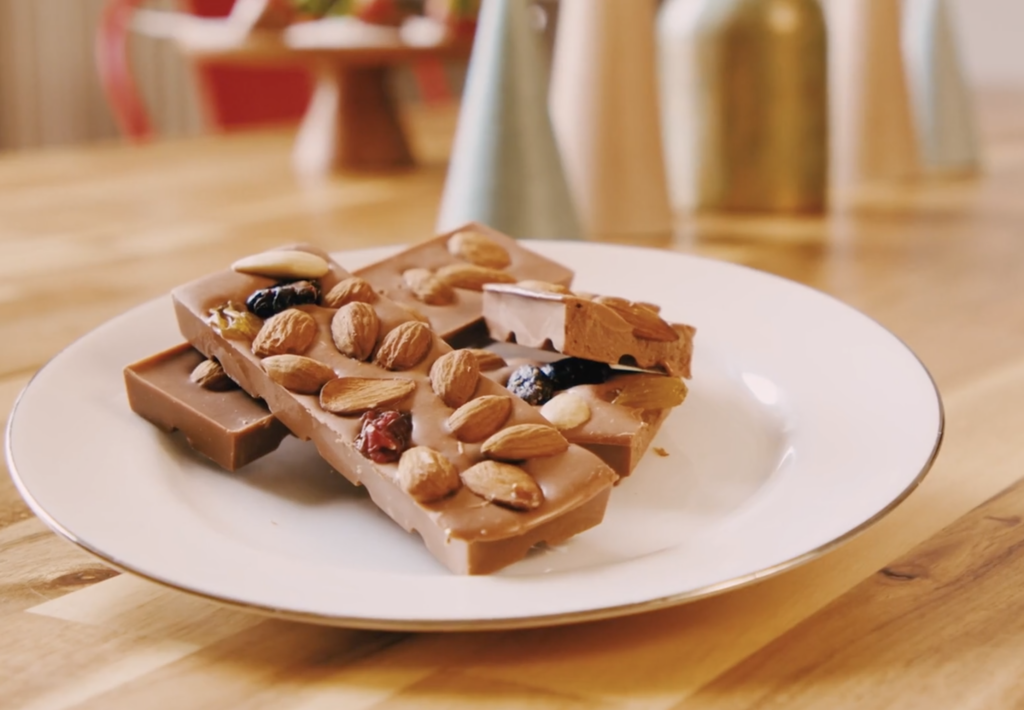
Founded by chocolate industry experts, British startup Nukoko is treating fava beans – the nitrogen-fixing, soil-friendly cover crop grown domestically in Europe – the same way cocoa producers process chocolate, turning the high-protein legumes into what they call a bean-to-bar cocoa-free chocolate. It is said to generate 90% fewer emissions, and contain high protein and fibre, as well as 40% less sugar.
Nukoko’s controlled fermentation process turns fava beans into cocoa powder, but is adaptable to different beans based on the climate of the local market. It won a place at the IndieBio accelerator programme in New York, and was named on Forward Fooding’s 2023 FoodTech 500 list. And it’s now working with fermentation giant Döhler to expand operations and co-develop new cocoa-free products.
Endless Food Co
Headquarters: Copenhagen, Denmark
Founders: Matthew Orlando, Christian Bach and Maximillian Bogenmann
Total funding: $1.05M
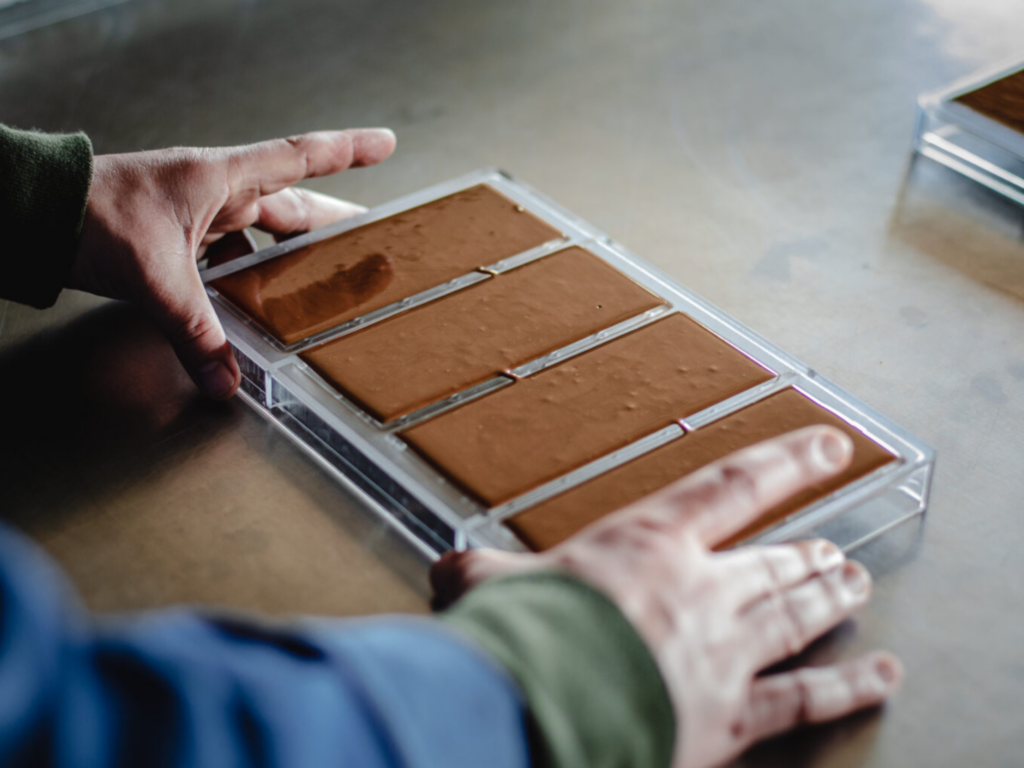
Danish startup Endless Food Co was set up by chefs from famous Copenhagen restaurant Amass, and is making use of brewer’s spent grain – a beer industry byproduct – to produce This Isn’t Chocolate (THIC). The company is hoping to create “a future for chocolate that isn’t married to palm oil or deforestation”, with its product associated with 80-90% fewer emissions.
Endless Food Co already has around 10 B2B clients in Denmark, Portugal, Sweden and more, which sold over 10,000 pastries with THIC in the last second half of 2023 alone. THIC has appeared at Il Buco, La Banchina, Kihoskh, and Kaf in Copenhagen, and Sem in Lisbon. It will next be seen at all 180 7-Eleven stores in Denmark, as part of a co-branded cookie under the Tim’s Cookies label.
Kokomodo
Headquarters: Rehovot, Israel
Founder/parent company: Tal Govrin, The Kitchen FoodTech Hub and Plantae Bioscience
Total funding: $750,000
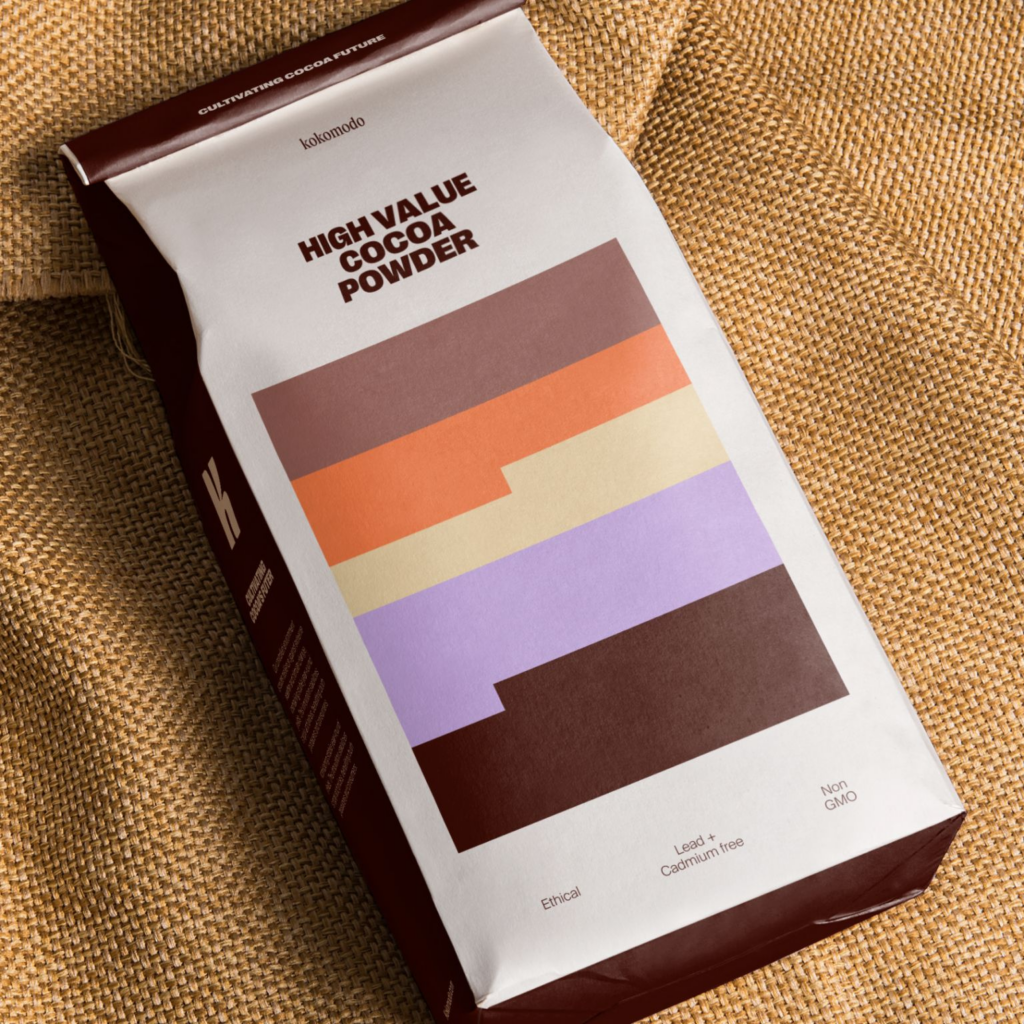
One of the newest players in the alt-chocolate ecosystem, Kokomodo takes the cells of premium cocoa beans grown in Central and South America, which are nurtured into a thriving cell culture. The production moves to advanced bioreactors as the biomass grows, after which the cacao is harvested and processed for different applications.
Kokomodo obtains different varieties and genotypes, as well as cell lines originating from different parts of the cacao seedling, creating a cacao cell library and analytical capabilities to seek out the best cacao cells to produce. Its cell-based ingredient can be used across different CPG categories, including chocolate, beverages, spreads, and protein bars, and the startup has indicated that it will explore a US launch first, where the regulatory process is simpler and quicker than in Europe.
The post Hot Chocolate, Hotter Planet: 9 Startups Making Cocoa-Free & Cell-Based Alternatives to Save Our Sweet Tooths appeared first on Green Queen.
This post was originally published on Green Queen.